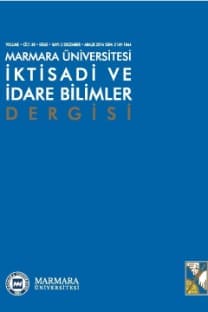PUBLIC GOODS GAMES WITH COSTLY SWITCHING FROM A STATUS QUO
We apply Guney and Richter’s (2016) choice model of costly switching from a status quo to publicgoods games. We find that non-zero contribution into the public good can be optimal under a status quocontribution level. Moreover, intermediate contribution levels are no longer optimal if the switching costdepends only on the status quo contribution level but not on the contribution level the agent switches to.
Anahtar Kelimeler:
Public Goods Game, Contribution, Switching Cost
___
- ANDREONI, J. (1989). Giving with Impure Altruism: Applications to Charity and Ricardian Equivalence, Journal of Political Economy, 97: 1447-1458.
- CHARNESS, G., Rabin, M. (2002). Understanding Social Preferences with Simple Tests, The Quarterly Journal of Economics, 117: 817-869.
- DUFWENBERG, M., Kirchsteiger, G. (2004). A Theory of Sequential Reciprocity, Games and Economic Behavior, 47: 268-298.
- GUNEY, B., Richter, M. (2016). Choice and Games with Switching Costs, https://drive.google.com/file/d/148r7XPBEFcgPO3w_D-RVSdVnFB2G7IhN/view?usp=sharing, (Erişim Tarihi: 5.12.2017).
- JOHNSON, E. J., Goldstein, D. (2003). Do Defaults Save Lives?, Science, 302: 1338–1339.
- MARWELL, G., Ames, R. (1979). Experiments on the Provision of Public Goods i: Resources, Interest, Group Size, and the Free-Rider Problem, American Journal of Sociology, 84: 1334–1360.
- MARWELL, G., Ames, R. (1980). Experiments on the Provision of Public Goods ii: Provision Points, Stakes, Experience, and the Free-Rider Problem, American Journal of Sociology, 85: 926–937.
- MARWELL, G., Ames, R. (1981). Economists Free Ride, Does Anyone Else? Experiments on the Provision of Public Goods, Journal of Public Economics, 15: 295–310.
- MASATLIOGLU, Y., Ok, E. (2005). Rational Choice with Status Quo Bias, Journal of Economic Theory, 121: 1–29.
- MESSER, K. D., Zarghamee, H., Kaiser, H. M., Schulze, W. D. (2007). New Hope for the Voluntary Contributions Mechanism: The Effects of Context, Journal of Public Economics, 91: 1783–1799.
- RABIN, M. (1993). Incorporating Fairness into Game Theory and Economics, The American Economic Review, 83: 1281-1302
- SCHNEIDER, F., Pommerehne, W. (1981). Free Riding and Collective Action: An Experiment in Public Microeconomics, The Quarterly Journal of Economics, 96: 689–704.
- ISSN: 1300-7262
- Başlangıç: 1984
- Yayıncı: Marmara Üniversitesi
Sayıdaki Diğer Makaleler
FARKLI BİR ÖZELLEŞTİRME ÖNERİSİ: GAYRİMENKUL SERMAYE İRADI VERGİLEME SÜRECİNİN ÖZELLEŞTİRİLMESİ
STATÜKODAN SAPMANIN MALİYETLİ OLDUĞU KAMU MALI OYUNLARI
Recep Baki DENİZ, Serkan DERİCİ, Emine KILIÇ
PUBLIC GOODS GAMES WITH COSTLY SWITCHING FROM A STATUS QUO
HİSSE SENEDİ PİYASASI GELİŞİMİ VE EKONOMİK BÜYÜME: GELİŞMEKTE OLAN PİYASALARA YENİ BİR BAKIŞ
THE IMPACT OF FLAT TAX RATES ON FOREIGN DIRECT INVESTMENT
Berna HIZARCI BEŞER, Mustafa Kemal BEŞER
CROSS-BORDER LOAN LIABILITY, THE EXCHANGE RATE AND PROFITABILITY IN THE TURKISH BANKING SECTOR
TÜRKİYE BANKACILIK SEKTÖRÜNDE YURTDIŞI KREDİ YÜKÜMLÜLÜĞÜ, DÖVİZ KURU VE KÂRLILIK
